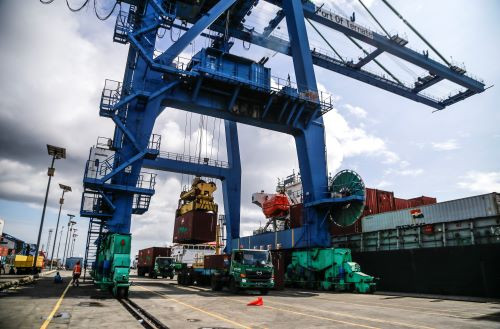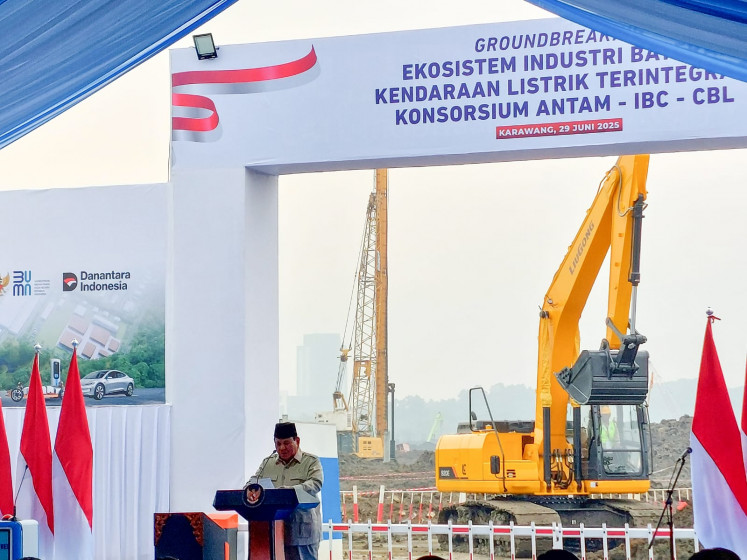Popular Reads
Top Results
Can't find what you're looking for?
View all search resultsPopular Reads
Top Results
Can't find what you're looking for?
View all search resultsIs Prabowo’s domination stunting Gerindra’s growth?
Waiting for the man: Supporters attend a campaign for Lt
Change text size
Gift Premium Articles
to Anyone

W
span style="width: 510px;">Waiting for the man: Supporters attend a campaign for Lt. Gen. (ret.) Prabowo Subianto, a potential presidential candidate from the Great Indonesia Movement (Gerindra) Party inside the Bung Karno Sports Stadium in Senayan, Central Jakarta, in this file photo. (JP/R. Berto Wedhatama)
The
chief patron of the Great Indonesia Movement (Gerindra) Party, Lt. Gen.
(ret.) Prabowo Subianto, is known as a strong-willed military leader.
Friends and enemies alike have told stories of his legendary temper, the
most famous incident being a heated exchange with then president BJ
Habibie over the latter’s decision to sack him from the leadership of
the Army’s Strategic Reserve Command (Kostrad) in May 1998.
Prabowo
may have recently joked that he should have launched a coup d’etat, but
his reputation remains long after his military days.
Analysts have said that Prabowo, even when he set up Gerindra on Feb. 6, 2008, has remained a strong-willed leader.
Little
has been heard about internal dynamics within Gerindra, that is until
last year when the public were made aware that Halida Hatta, daughter of
the country’s first vice president, had decided to leave the party.
Believing
that she shared the party’s vision, to bring equality and prosperity to
more people, Halida had joined Gerindra in 2007 and helped set up the
party’s internal rules together with other executives, including deputy
chairman Fadli Zon and secretary-general Ahmad Muzani.
Many
believed that Halida’s inclusion on the party’s executive board would
give a feminine touch to a party that had, thus far, been dominated by
military figures such as Maj. Gen. (ret.) Muchdi Purwoprandjono, an ally
of Prabowo and former deputy chairman of the National Intelligence
Agency (BIN) and Lt. Col. Eddhy Prabowo, a middle ranking officer with
the Indonesian Army, who now serves as House of Representatives
Commission VI on state-owned enterprises.
It was also expected
that Halida would improve the profile of the party, which is now marred
by the association with human rights abuses.
Prabowo himself has
been accused of involvement in human rights abuses during his stint in
East Timor (now Timur Leste) as well as an alleged role in the
kidnapping of pro-democracy activists in May 1998.
Muchdi was
tried for his involvement in the murder of human rights campaigner Munir
Said Thalib in 2004. He was cleared of all charges.
Muchdi left Gerindra to join the United Development Party (PPP) in early 2011 due to a “personal conflict” with Prabowo.
No
details were available as to why Muchdi decided to leave the party, but
Fadli said later that Muchdi’s deeply regretted the decision and he
hoped that Muchdi, who was then a close ally of Prabowo, would “get what
he wants” in PPP.
As for Halida, she stated clearly that she had
resigned from the party because there was no decision making mechanism
to speak of.
Soon after she announced her resignation from
Gerindra in July last year, Halida said she was forced into the decision
because she was excluded from the decision making process within
Gerindra.
Halida also lamented the party’s arbitrary decision to
transfer the votes that she won in the election to other candidates,
without her consent. Citing the incident as an indication of a “critical
communication” problem within Gerindra.
Moreover, Halida has not been the only one to go.
In
March last year, during the party’s extraordinary meeting, Prabowo
announced the dismissal of the party’s head of science and technology,
Fami Fachrudin, which many party members said was the pinnacle of an
internal rift within the party. Fami later issued a statement
criticizing the party’s culture.
“The military clique [in
Gerindra] has led to an abuse of power, which prevents criticism of the
leadership,” Fami said through his Twitter account.
Supporters of Prabowo said that democracy prevails within the party.
“Nothing
is wrong with Pak Prabowo’s leadership. He leads us according to our
internal regulations,” secretary-general Ahmad Muzani told The Jakarta
Post recently, adding that the resignation of some party executives were
of a personal nature.
“Regulations have granted Pak Prabowo the
authority, as the chief patron, to make decisions concerning the party.
You fill find the same mechanism in other parties,” Muzani emphasized.









